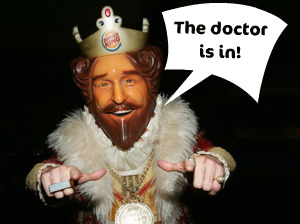Today’s newspaper contained some great news. Nearly $9 million of federal stimulus money is flowing to Portland in the form of a grant to open a health care clinic for the poor in the middle of downtown. And the best part (at least in my mind) is that it’s taking an old, abandoned Burger King and transforming it into a one-stop medical center helping Portland’s poor, homeless, and mentally ill.

I love the idea of using a place that once dispensed artery-clogging Whoppers and French fries, sugar drinks, and all manner of other greasy, deep fried anti-nutrition (don’t get me wrong, I love all of that stuff—too much, in fact), and turning it into a place that does exactly the opposite: dispenses health, medicine, help.
No doubt when you look at the building, you’ll still be able to tell it was a Burger King because of its very distinctive design. And yet that building will be making a whole different kind of impact with its presence.
And all that made me think of Christmas.
When I first became aware of the “pagan” origins of Christian celebrations like Christmas and Easter, it came as a bit of a shock. But those who decide that the responsible thing is to eschew celebrating Christmas altogether (or at least the non-Jesusy parts) really miss the point.
Certainly many cultures and religions have holidays around this time of year, mostly started to celebrate the turn from shorter and shorter days to longer and longer ones. The move from darkness to light. And when the early Christians looked at that, it seems they had a really good idea. There’s no reason to think that Jesus was born on December 25th. They knew that. He was most likely born sometime in the spring, because the shepherds were out in the fields keeping watch over their flocks, a spring activity. But even though there’s no reason to believe he was born in late December, there are great reasons to celebrate at that time.
Whenever we bring the Gospel into a culture, we have a responsibility to contextualize it—to use the language, the symbols and the existing social structure (where it doesn’t overtly contradict the Gospel)—to explain the great Good News that God himself has come to rescue and renew all of creation through the work of Jesus Christ on our behalf.
So what should you do when your culture has a winter celebration hard-wired in? Do you fight it? Talk about humbug. Or do you find a way to re-contextualize it?
A celebration about the coming of light into the world after a time of darkness? Hmmm…sounds familiar. Sounds perfect, in fact. Custom made for re-interpretation in light of the narrative of the Gospel of Jesus. Custom made to explain the coming of the Son of Righteousness into our darkness.
Those early followers of Jesus who gave us things like Christmas, far from retreating from their culture, simply repurposed some of the best parts of it. Like the solstice celebrations. And like I said, I love the irony of taking something meant to point to one thing and making it point to a better thing. Like a Burger King becoming a health clinic.
When asked about Christmas, Marie Elena Castle of Minneapolis, the 82-year-old founder of Atheists for Human Rights and an atheist activist for two decades, said, “The Christians stole it.”
Exactly.
We took something that pointed at the sun and pointed it towards the Son—the One who made the seasons, the sun and the moon, the one who came to give us a real reason to celebrate: Jesus.
So if you don’t want to celebrate Christmas, that’s fine. It’s your choice! But you’re not just taking yourself out of a very Christian tradition, but a very human one as well.
And don’t tell me celebrating Advent isn’t a great way to tell the Gospel story in a hundred different ways: to our kids in our Advent readings, to our neighbors in our hospitality and gift-giving (at a time when they are more open to that than any other time in the year), and especially to ourselves, maybe the ones who need most to hear, “Do not be afraid. I bring you good news of great joy that will be for all the people….Today in the town of David a Savior has been born to you; he is Christ the Lord.”









